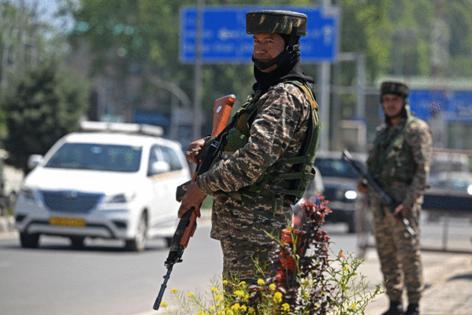US races to calm India-Pakistan tensions as signs mount of clash
Published in News & Features
The U.S. is pushing to calm tensions between India and Pakistan as signs mount of an imminent clash after militants last week killed dozens of tourists on the Indian-controlled side of the disputed Himalayan region of Kashmir.
Secretary of State Marco Rubio plans to speak with the foreign ministers of both countries in a bid to de-escalate the situation, U.S. State Department spokesperson Tammy Bruce told reporters in Washington on Tuesday. Rubio is also encouraging other nations to reach out as well, she added.
“We of course are encouraging all parties to work together for a responsible solution,” Bruce said. “The world is watching this.”
Ties between the nuclear-armed nations have rapidly deteriorated in the wake of the attack, which India has called an act of terrorism. Prime Minister Narendra Modi’s government has accused Pakistan of involvement and vowed to punish those responsible. Pakistan has denied any links to the attacks and warned of retaliation if India takes military action.
Modi gave India’s armed forces a free hand to decide on the timing, target and mode of responding to the attack in a meeting that included Defence Minister Rajnath Singh and National Security Advisor Ajit Doval, the Economic Times reported Tuesday, citing people it didn’t identify. India’s Prime Minister’s Office didn’t immediately respond to an email sent after office hours seeking details of the meeting.
In a televised speech Wednesday shortly after midnight, Pakistan Information Minister Attaullah Tarar said his country has “credible intelligence” that India would carry out military action in the next 24 to 36 hours. He warned that Pakistan would respond “assuredly and decisively.”
“The international community must remain alive to the reality that the onus of escalatory spiral and its ensuing consequences shall squarely lie with India,” Tarar said. “The nation reiterates its resolve to defend the sovereignty and territorial integrity of Pakistan at all costs.”
Pakistan’s assets have taken a hit this month, with stocks and dollar bonds set for their worst monthly performance in two years. Dollar bonds have handed investors a loss of nearly 4% this month, while stocks are down almost 3%. The escalating tensions come at a time when the nation’s economy is in a fragile condition and dependent on International Monetary Fund’s funding for support.
Meanwhile, Indian assets are proving relatively immune for now with stocks and local bonds up this month.
Pakistan’s army on Tuesday shot down an Indian spy drone that breached the so-called Line of Control in Kashmir, a northern region claimed by both countries, according to Pakistan’s state-run television channel. Both sides have shot down small drones in the past as they are often used for surveillance around the border.
On Wednesday, India’s army accused Pakistan of firing across the Line of Control for a sixth consecutive day, saying its forces responded “swiftly” and “proportionately” to what it described as “unprovoked small arms fire.”
India imposed punitive measures in the wake of the April 22 attack, including downgrading diplomatic ties and suspending a crucial water-sharing treaty. Pakistan retaliated by expelling Indian diplomats from Islamabad, closing its airspace to Indian-owned and Indian-operated airlines, and suspending the limited trade between the nations.
Pakistan Defense Minister Khawaja Muhammad Asif this week warned of the threat of war but said it can be averted. He added that China, Saudi Arabia and other Gulf states were working to prevent conflict from breaking out.
Lieutenant General Ahmed Sharif Chaudhry, Pakistan’s military spokesman, said India hasn’t provided any “shred of evidence” to support its “baseless allegations” linking Islamabad to the Kashmir attack. The two neighbors have long accused each other of sponsoring cross-border terrorism, a major obstacle in normalizing their relations and resolving the Kashmir dispute through dialog.
The ceasefire agreement signed by the two countries in 2003 had been frequently violated until 2021, when both nations renewed their commitment to uphold the truce. Cross-border firing had largely ceased over the past three years.
Since achieving independence from Britain in 1947, India and Pakistan have fought several times over the disputed Himalayan region. The most recent prolonged fighting occurred in 1999, when Pakistani troops infiltrated Kargil, an Indian-controlled district in Kashmir. That lasted for several months until Pakistani forces withdrew from locations on the Line of Control, the de facto border.
The last time the two sides came close to an all-out war was in 2019, when a suicide bomber killed 40 members of India’s security forces. Jaish-e-Mohammed (Soldiers of Mohammed), a Pakistan-based jihadi group, claimed responsibility at the time, prompting India to respond about two weeks later with its first airstrikes on Pakistani soil since 1971.
India said its fighter jets attacked an alleged militant training camp in northern Pakistan, with an official saying about 300 militants were killed. Pakistan denied any camp was hit and the next day downed an Indian fighter plane in a dogfight, the first between the two nations in almost 50 years.
-----------
With assistance from Abhay Singh, Harshita Swaminathan and Jon Herskovitz.
©2025 Bloomberg L.P. Visit bloomberg.com. Distributed by Tribune Content Agency, LLC.







Comments